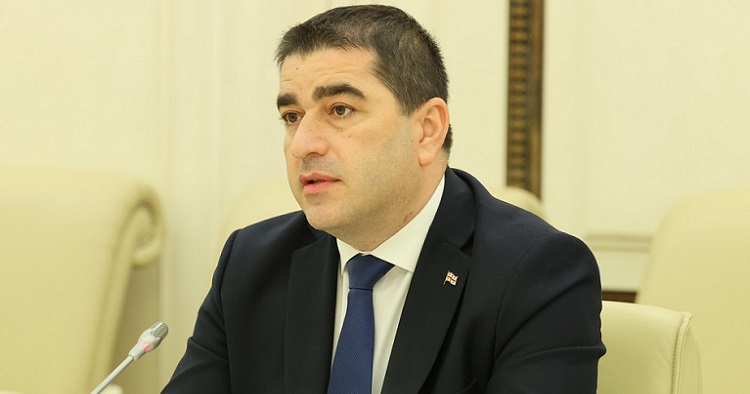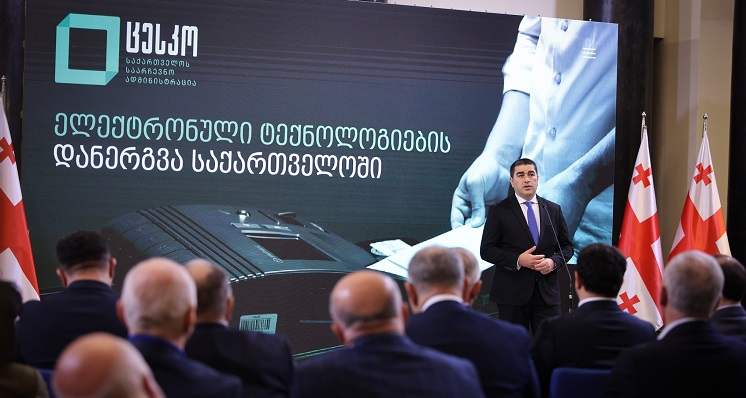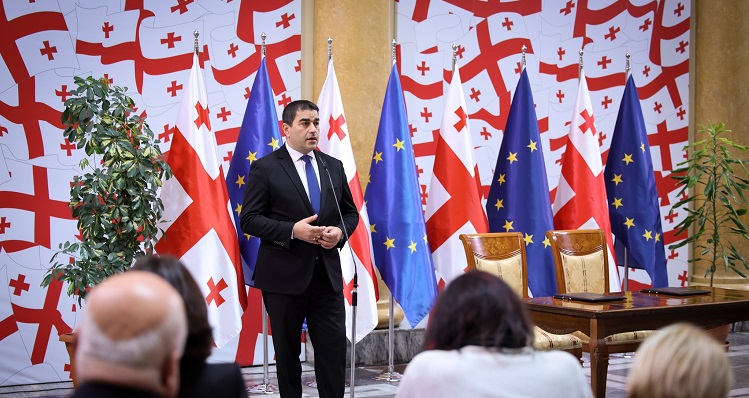Civil society should play a constructive role in 2024 elections

Georgian Parliament Speaker Shalva Papuashvili spoke about the role of domestic CSOs in election process. Photo: Shalva Papuashvili's Facebook

Having successfully obtained the EU candidate country status, Georgia is now poised to engage in membership negotiations with the European Union. We are now working on new ‘9 steps’. And this is a challenging period for our future integration with the EU, because the process coincides with the parliamentary elections later this year. Therefore, we need to make a serious effort to secure our democracy.
Georgian government, as in the case of its successful bid for EU candidacy, will do its utmost to clear this level too. However, it is also important that Georgian civil society is active, benevolent, and constructive. There have recently been some good signs, such as the ongoing cooperation between the Parliament and the Georgian National Platform of Eastern Partnership Civil Society Forum (aka National Platform), which unites some 200 non-governmental organisations and is formally endorsed by the European Union.
Government does welcome the engagement of civil society. However, some serious issues remain that boil down to truthfulness and political impartiality that need to be resolved. Recent actions of some NGOs do not show signs of progress in this regard. Most recent Eastern Partnership Index report, written by NGOs, was unfairly biassed against Georgia. NGOs that participated in the work on the Index later left the National Platform. It seems their only purpose, while in the Platform, was to distort the truth. Abusing and then abandoning the only EU-approved large civil society union that interacts with the government was simply wrong.
Moreover, the same NGOs that distorted the findings of the Index are now manipulating with the ongoing work on ‘9 Steps to EU’ negotiations. These NGOs claim they want to join the ongoing formal discussion, even if they had abandoned the National Platform when they became displeased with the election results of the Platform’s leadership. Such actions jeopardise the cooperation of the Parliament with the National Platform and show how some NGOs can become problematic for the democratic process. Their zero-sum pattern of action resembles that of radical political parties: Any time they are unhappy about their preferred results in any process, they turn against the process itself and try to destroy or abandon it.
 Georgian Parliament Speaker Shalva Papuashvili during the presentation of new election technologies, prior to this year's elections. Photo: Shalva Papuashvili's Facebook
Georgian Parliament Speaker Shalva Papuashvili during the presentation of new election technologies, prior to this year's elections. Photo: Shalva Papuashvili's Facebook
However, this article is not about questioning the CSOs’ legitimacy or their role but to find common modus operandi before the 2024 elections so that to achieve most optimal results for our country on the EU path. Let us start with the simple premise: NGOs cannot be equated with civil society, which is a broader concept. Therefore, NGOs, while being unelected bodies, have to address two major issues if they are to claim their legitimate right to be representative of the wider society and be included in the policymaking process.
The first issue is that NGOs are almost entirely financed from abroad, rather than funded with grassroots money or with finances from the domestic interest groups. And the second issue is that their obvious attempts at influencing political decisions raise questions about their political affiliation. Let us discuss these problems and their plausible solutions.
Some NGOs are rich. They would have been richer than most Georgian political parties, had they registered as such. The richest five NGOs in Georgia have more money than all political parties combined, in non-election period. However, most of this funding comes from foreign sources. The question is why. In Georgia, people and businesses do donate to political parties, including those in opposition, which means that there is no fear of political retribution. Moreover, there is also lots of money spent on charity, which means people and businesses are not stingy either. Given these factors, it is really surprising that NGOs never managed to convince either the public or businesses to fund their activities and, thus, have to rely almost exclusively on foreign funding.
The fact that some NGOs are richer than political parties causes yet another problem. The well-funded NGOs work with small parties and contribute to their overall development. Given these benefits, small parties become vulnerable to the NGOs’ undue influence. This became evident in the case of the election of public defender last year, which was one of the EU recommendations. When NGOs sensed that the consensus on the candidacy of public defender was emerging in the Parliament, they, privately, started pressuring small parties to withdraw their votes, because those NGOs did not approve of the ombudsman’s candidacy.
Certainly, the major problem with foreign funding is that it frequently lacks transparency. There is no convincing explanation of why this should be. Clearly, NGOs have never encountered persecution for their activities, at least since Georgian Dream came to power. These politically active NGOs do not feel accountable to the wider civil society or the democratically elected authorities. The fact that several NGOs simply abandoned the National Platform is a good example of such irresponsibility, as the Parliament and the rest of civil society only found out about their decision post factum, while, it appears, the donors had known about the decision beforehand. That NGOs are accountable not to the public but to their donors also raises a big issue of the donors’ responsibility. The donors cannot do away by simply putting a disclaimer on NGOs’ activities any more. A more serious approach is needed because civil society is an influential political force.
The second issue with the NGOs is their political bias. We can discern a strong link between some CSOs and political forces. Most of their leadership includes former officials (ministers, deputy ministers, MPs, etc.) of the Saakashvili government. It is not surprising, therefore, that CSOs have become particularly active since 2020 elections and, at some point, even directly declared their willingness to form an extraordinary Cabinet and even participate in such ad-hoc government’s activities. One of them, ISFED, was complicit in undue meddling with the parallel vote tabulation during the 2020 elections. In some, particularly paradoxical cases, some NGOs bear the names of their umbrella political parties. These parties utilise foreign money that flows to ‘their’ NGOs for political purposes. For instance, online magazine Tabula and NGO ‘Liberty Institute’ are branches of European Georgia, NGOs ‘Droa’ and ‘For People’ are directly subordinated to the eponymous parties. In these cases, foreign funding means direct foreign influence on political groups, which is blatantly unconstitutional.
 Speaker Papuashvili highlighted the importance of Georgia's obtaining EU candidacy last year. Photo: Shalva Papuashvili's Facebook
Speaker Papuashvili highlighted the importance of Georgia's obtaining EU candidacy last year. Photo: Shalva Papuashvili's Facebook
Besides funding, certain elite NGOs’ political bias is problematic from another perspective: They are supportive of radical political parties that attack the democratically elected government of Georgia, frequently declaring the latter as illegitimate. Thus, NGOs’ refusal to observe political neutrality invigorates radical political forces. So, these NGOs act as proxies for radical parties, but shun political responsibility for their actions.
Responsibility is the key word here. Had the radicals achieved their objective and overthrown the government in years 2020-2022, who would have taken the responsibility for the ensuing chaos and the actions of a likely dictatorial group? I doubt either NGOs or their foreign funders would do that. Radicalisation is not an answer to Georgia’s needs. Yet, some NGOs just do that – they help the radicals to undermine Georgia’s drive towards the EU.
To conclude, we can address the above discussed dual challenge in two major steps. The first is to increase financial transparency and achieve full disclosure of NGOs’ activities. This would nicely match the Georgian government’s exemplary record on transparency, corroborated by many authoritative international bodies, including the Open Governance Partnership. There was a good initiative in 2016, when 18 NGOs signed a ‘Declaration on Transparency’ and committed to periodical publication of their activities and funding on a web portal (cso.ge) created for that purpose ( https://shorturl.at/djS25 ). Some NGOs, complicit in the above described controversies, were amongst the early enthusiasts of the portal. Regrettably, the portal was abandoned in less than a year. Now, however, nothing stands in the way to the revival of this Project, except for the goodwill of the NGOs themselves.
Second step is that donors take up their share of responsibility for the actions of the NGOs they fund. This would be similar to when the donors claim credit for what NGOs accomplish on their behalf. They can also make their funding more transparent. There are international mechanisms for making this approach an ethical rule for international aid. In the Paris Declaration on Aid Effectiveness, donors and partner countries agreed to be accountable to each other so that to make aid more effective in delivering development results. We should follow the spirit of this Declaration.
Before elections, we could draw a public agreement that would require full disclosure of the funding and activities of any NGO that meddles in politics, either as an election observer or funder of activities related to elections. This would make NGOs’ activities so much more trustworthy, and contribute to constructive dialogue between the parties.
Free and fair election is a common responsibility. The disinformation campaign that raged to discredit the results of the 2020 elections reminds us that, in an open society, elections are not a matter only of the government’s obligation. All actors, including the government, opposition, civil society, media, and international actors, with their political or financial contribution, bear their share of responsibility for contributing to free and fair elections.
 Tweet
Tweet  Share
Share